外研版英语中考语言基础知识梳理与训练 第3课 七年级上册 Modules 6—10
文档属性
| 名称 | 外研版英语中考语言基础知识梳理与训练 第3课 七年级上册 Modules 6—10 | 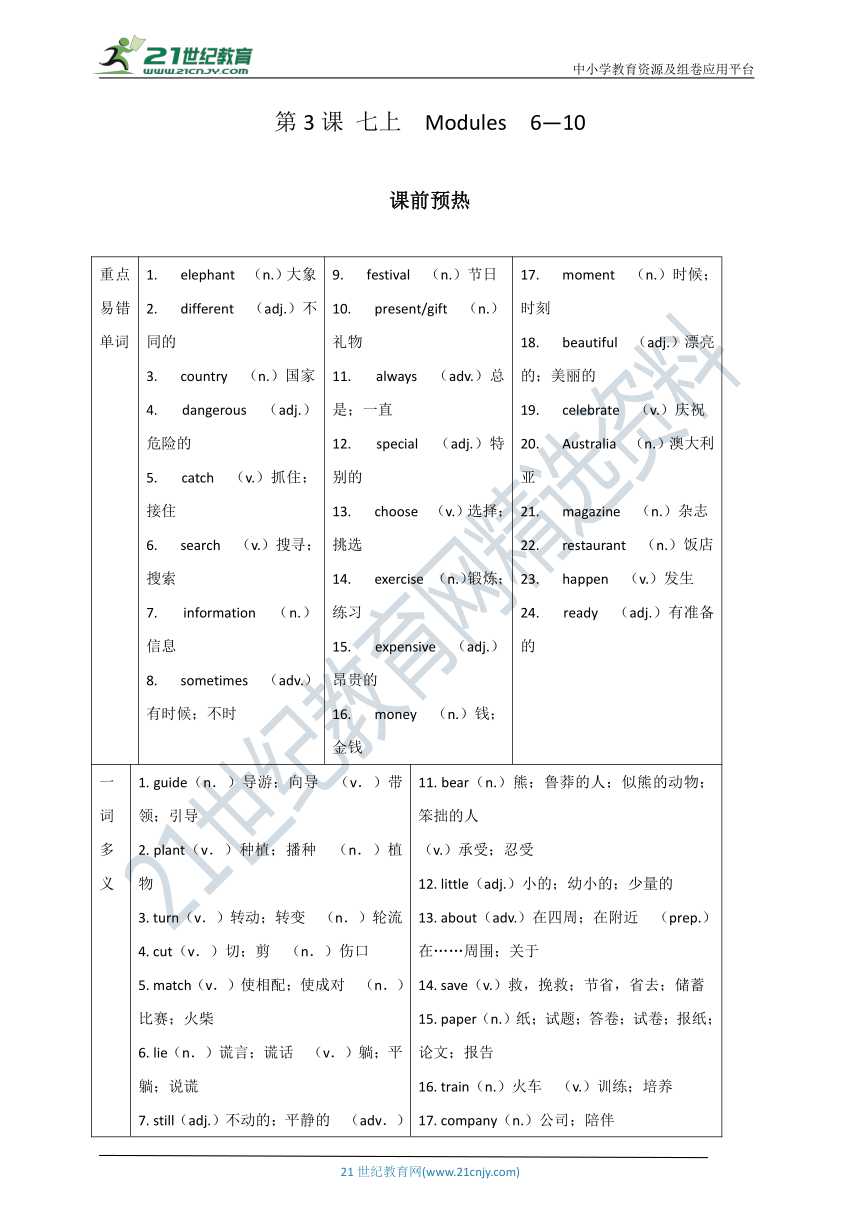 | |
| 格式 | doc | ||
| 文件大小 | 1.3MB | ||
| 资源类型 | 试卷 | ||
| 版本资源 | 外研版 | ||
| 科目 | 英语 | ||
| 更新时间 | 2022-02-05 08:47:21 | ||
图片预览

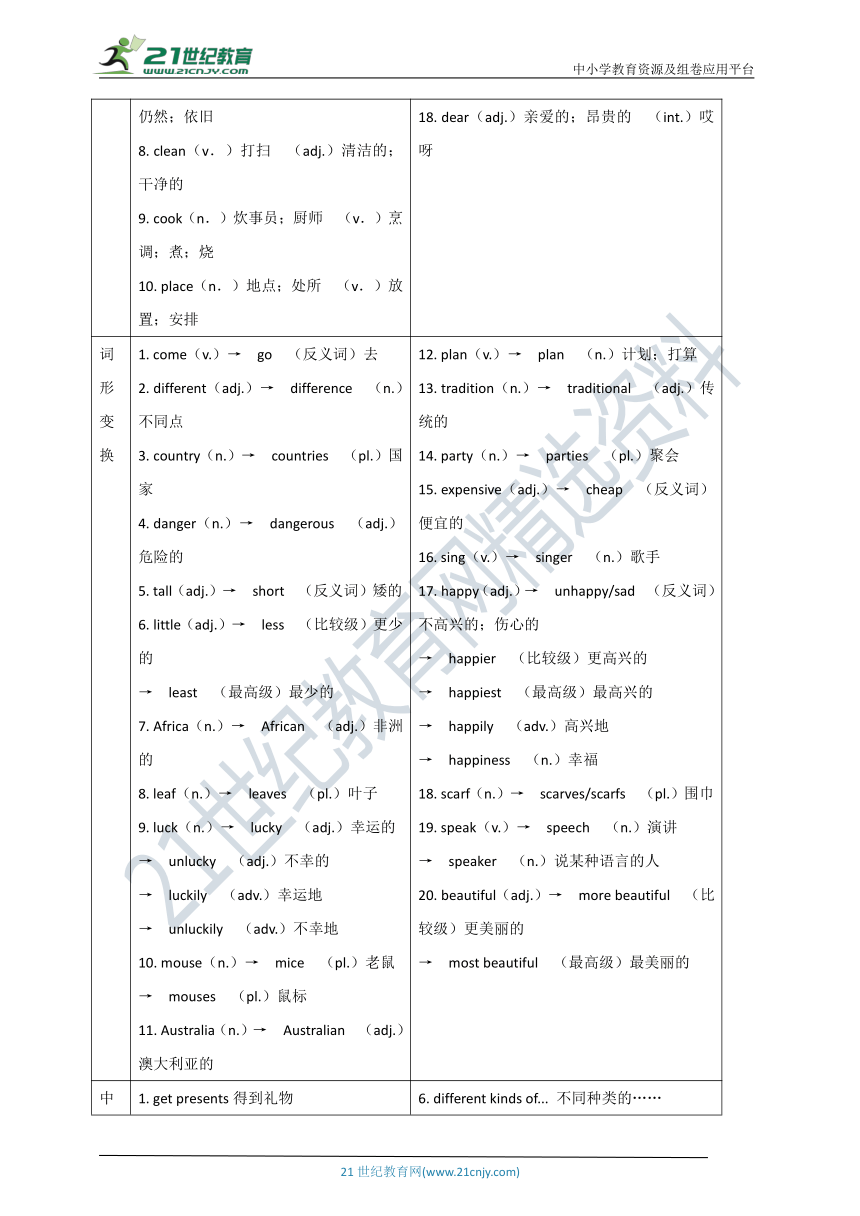
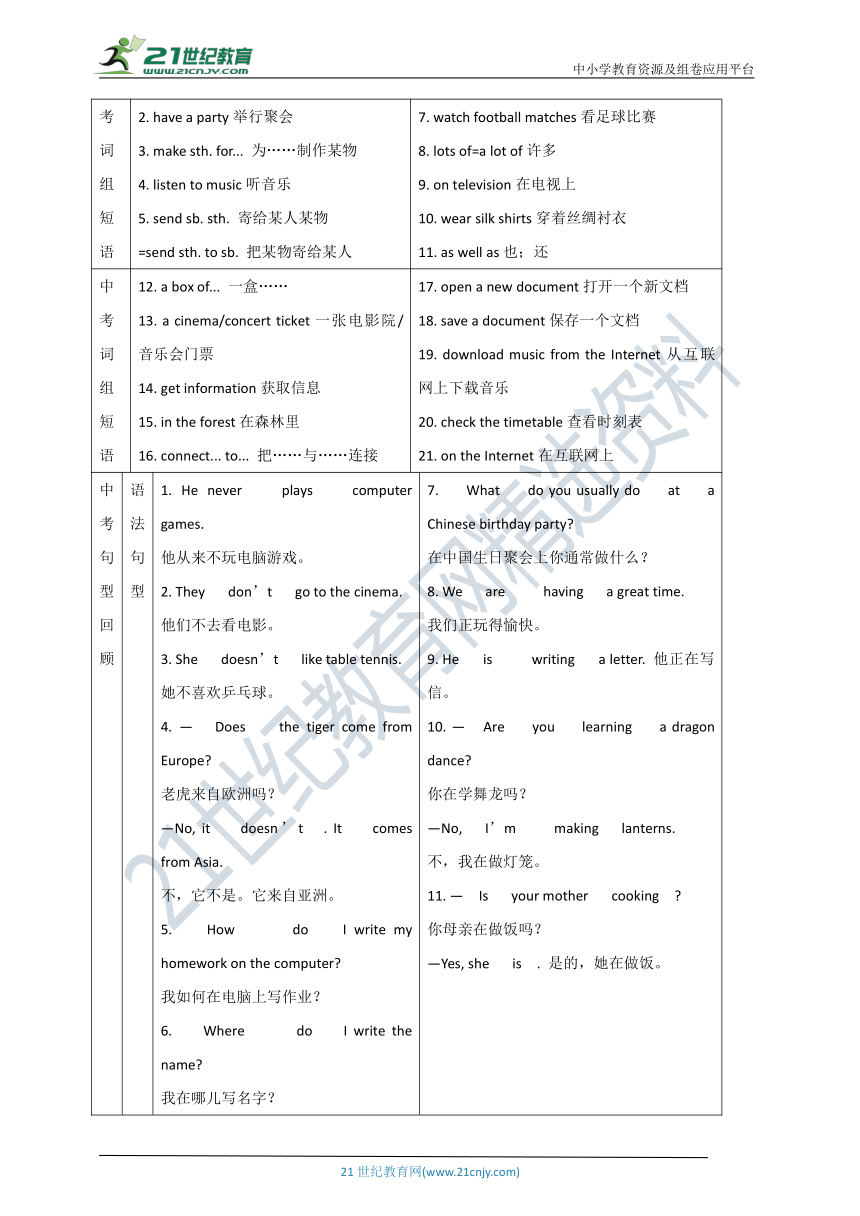
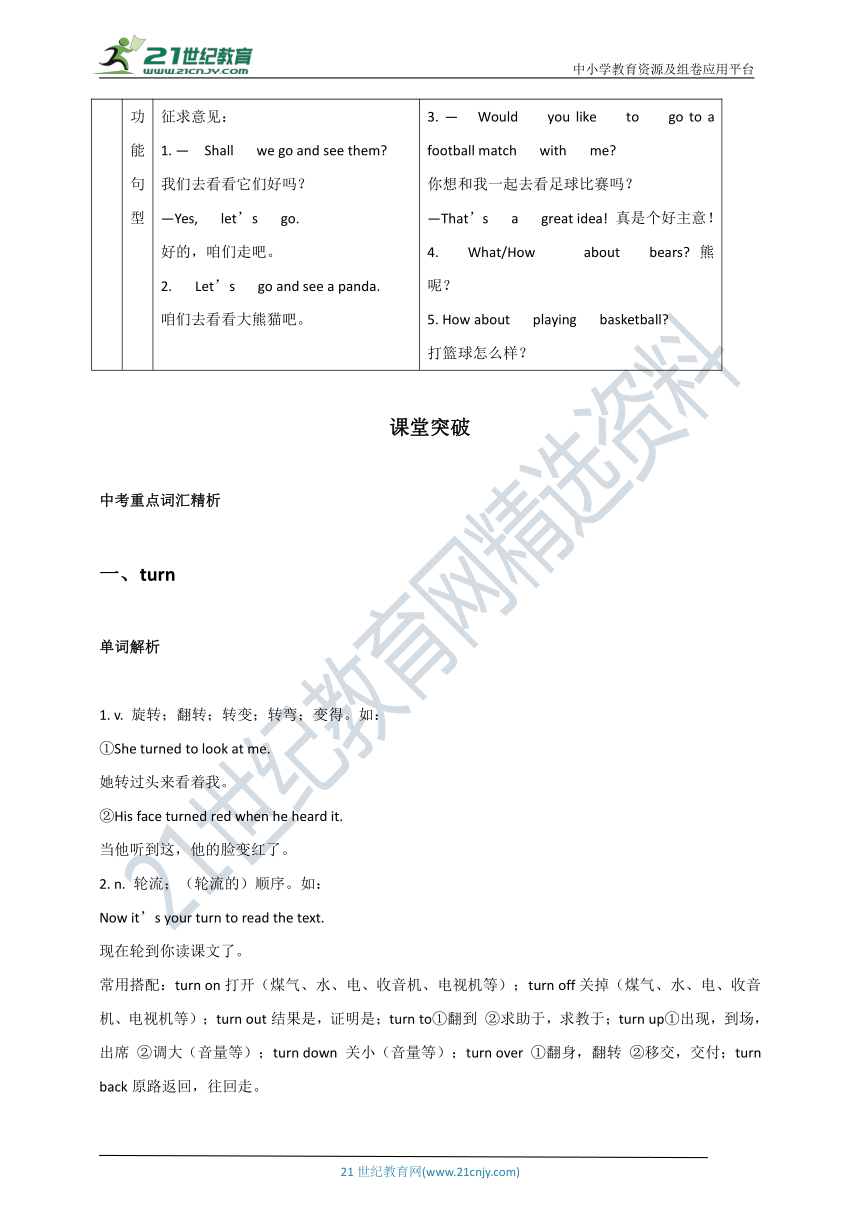
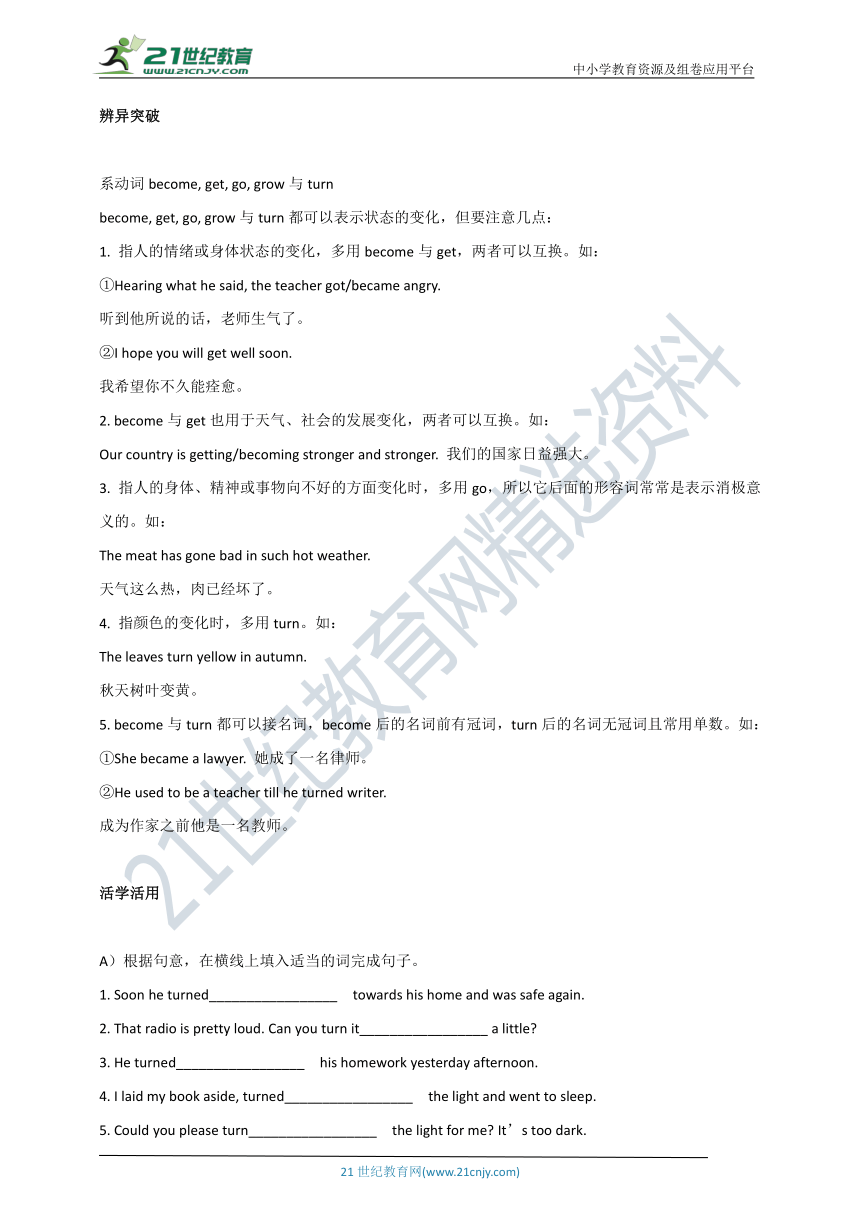
文档简介
中小学教育资源及组卷应用平台
第3课 七上 Modules 6—10
课前预热
重点易错单词 1. elephant (n.)大象2. different (adj.)不同的3. country (n.)国家4. dangerous (adj.)危险的5. catch (v.)抓住;接住6. search (v.)搜寻;搜索7. information (n.)信息8. sometimes (adv.)有时候;不时 9. festival (n.)节日10. present/gift (n.)礼物11. always (adv.)总是;一直12. special (adj.)特别的13. choose (v.)选择;挑选14. exercise (n.)锻炼;练习15. expensive (adj.)昂贵的16. money (n.)钱;金钱 17. moment (n.)时候;时刻18. beautiful (adj.)漂亮的;美丽的19. celebrate (v.)庆祝20. Australia (n.)澳大利亚21. magazine (n.)杂志22. restaurant (n.)饭店23. happen (v.)发生24. ready (adj.)有准备的
一词多义 1. guide(n.)导游;向导 (v.)带领;引导2. plant(v.)种植;播种 (n.)植物3. turn(v.)转动;转变 (n.)轮流4. cut(v.)切;剪 (n.)伤口5. match(v.)使相配;使成对 (n.)比赛;火柴6. lie(n.)谎言;谎话 (v.)躺;平躺;说谎7. still(adj.)不动的;平静的 (adv.)仍然;依旧8. clean(v.)打扫 (adj.)清洁的;干净的9. cook(n.)炊事员;厨师 (v.)烹调;煮;烧10. place(n.)地点;处所 (v.)放置;安排 11. bear(n.)熊;鲁莽的人;似熊的动物;笨拙的人 (v.)承受;忍受12. little(adj.)小的;幼小的;少量的13. about(adv.)在四周;在附近 (prep.)在……周围;关于14. save(v.)救,挽救;节省,省去;储蓄15. paper(n.)纸;试题;答卷;试卷;报纸;论文;报告16. train(n.)火车 (v.)训练;培养pany(n.)公司;陪伴18. dear(adj.)亲爱的;昂贵的 (int.)哎呀
词形变换 1. come(v.)→ go (反义词)去2. different(adj.)→ difference (n.)不同点3. country(n.)→ countries (pl.)国家4. danger(n.)→ dangerous (adj.)危险的5. tall(adj.)→ short (反义词)矮的6. little(adj.)→ less (比较级)更少的→ least (最高级)最少的7. Africa(n.)→ African (adj.)非洲的8. leaf(n.)→ leaves (pl.)叶子9. luck(n.)→ lucky (adj.)幸运的→ unlucky (adj.)不幸的→ luckily (adv.)幸运地→ unluckily (adv.)不幸地10. mouse(n.)→ mice (pl.)老鼠→ mouses (pl.)鼠标11. Australia(n.)→ Australian (adj.)澳大利亚的 12. plan(v.)→ plan (n.)计划;打算13. tradition(n.)→ traditional (adj.)传统的14. party(n.)→ parties (pl.)聚会15. expensive(adj.)→ cheap (反义词)便宜的16. sing(v.)→ singer (n.)歌手17. happy(adj.)→ unhappy/sad (反义词)不高兴的;伤心的→ happier (比较级)更高兴的→ happiest (最高级)最高兴的→ happily (adv.)高兴地→ happiness (n.)幸福18. scarf(n.)→ scarves/scarfs (pl.)围巾19. speak(v.)→ speech (n.)演讲→ speaker (n.)说某种语言的人20. beautiful(adj.)→ more beautiful (比较级)更美丽的→ most beautiful (最高级)最美丽的
中考词组短语 1. get presents得到礼物2. have a party举行聚会3. make sth. for... 为……制作某物4. listen to music听音乐5. send sb. sth. 寄给某人某物=send sth. to sb. 把某物寄给某人 6. different kinds of... 不同种类的……7. watch football matches看足球比赛8. lots of=a lot of许多9. on television在电视上10. wear silk shirts穿着丝绸衬衣11. as well as也;还
中考词组短语 12. a box of... 一盒……13. a cinema/concert ticket一张电影院/音乐会门票14. get information获取信息15. in the forest在森林里16. connect... to... 把……与……连接 17. open a new document打开一个新文档18. save a document保存一个文档19. download music from the Internet从互联网上下载音乐20. check the timetable查看时刻表21. on the Internet在互联网上
中考句型回顾 语法句型 1. He never plays computer games.他从来不玩电脑游戏。2. They don’t go to the cinema.他们不去看电影。3. She doesn’t like table tennis.她不喜欢乒乓球。4. — Does the tiger come from Europe 老虎来自欧洲吗?—No, it doesn’t . It comes from Asia.不,它不是。它来自亚洲。5. How do I write my homework on the computer 我如何在电脑上写作业? 6. Where do I write the name 我在哪儿写名字? 7. What do you usually do at a Chinese birthday party 在中国生日聚会上你通常做什么?8. We are having a great time.我们正玩得愉快。9. He is writing a letter. 他正在写信。10. — Are you learning a dragon dance 你在学舞龙吗?—No, I’m making lanterns.不,我在做灯笼。11. — Is your mother cooking 你母亲在做饭吗?—Yes, she is . 是的,她在做饭。
功能句型 征求意见:1. — Shall we go and see them 我们去看看它们好吗?—Yes, let’s go.好的,咱们走吧。2. Let’s go and see a panda.咱们去看看大熊猫吧。 3. — Would you like to go to a football match with me 你想和我一起去看足球比赛吗?—That’s a great idea! 真是个好主意!4. What/How about bears 熊呢?5. How about playing basketball 打篮球怎么样?
课堂突破
中考重点词汇精析
一、turn
单词解析
1. v. 旋转;翻转;转变;转弯;变得。如:
①She turned to look at me.
她转过头来看着我。
②His face turned red when he heard it.
当他听到这,他的脸变红了。
2. n. 轮流;(轮流的)顺序。如:
Now it’s your turn to read the text.
现在轮到你读课文了。
常用搭配:turn on打开(煤气、水、电、收音机、电视机等);turn off关掉(煤气、水、电、收音机、电视机等);turn out结果是,证明是;turn to①翻到 ②求助于,求教于;turn up①出现,到场,出席 ②调大(音量等);turn down 关小(音量等);turn over ①翻身,翻转 ②移交,交付;turn back原路返回,往回走。
辨异突破
系动词become, get, go, grow与turn
become, get, go, grow与turn都可以表示状态的变化,但要注意几点:
1. 指人的情绪或身体状态的变化,多用become与get,两者可以互换。如:
①Hearing what he said, the teacher got/became angry.
听到他所说的话,老师生气了。
②I hope you will get well soon.
我希望你不久能痊愈。
2. become与get也用于天气、社会的发展变化,两者可以互换。如:
Our country is getting/becoming stronger and stronger. 我们的国家日益强大。
3. 指人的身体、精神或事物向不好的方面变化时,多用go,所以它后面的形容词常常是表示消极意义的。如:
The meat has gone bad in such hot weather.
天气这么热,肉已经坏了。
4. 指颜色的变化时,多用turn。如:
The leaves turn yellow in autumn.
秋天树叶变黄。
5. become与turn都可以接名词,become后的名词前有冠词,turn后的名词无冠词且常用单数。如:
①She became a lawyer. 她成了一名律师。
②He used to be a teacher till he turned writer.
成为作家之前他是一名教师。
活学活用
A)根据句意,在横线上填入适当的词完成句子。
1. Soon he turned_________________ towards his home and was safe again.
2. That radio is pretty loud. Can you turn it_________________ a little
3. He turned_________________ his homework yesterday afternoon.
4. I laid my book aside, turned_________________ the light and went to sleep.
5. Could you please turn_________________ the light for me It’s too dark.
6. A big wave turned_________________ the fishing boat and two men died.
7. Please turn_________________ page 105, my children.
8. He turned_________________ too late and the manager was so angry.
9. When John had a fever, he felt cold and hot_________________ turns.
10. The experiment turned_________________ to be a great success.
B)选词填空。
11. In hot weather, milk_________________ (goes/turns) bad easily.
12. The man’s face_________________ (grew/turned) pale when he heard the terrible news.
13. It’s_________________ (getting/turning) colder and colder.
14. He_________________ (became/turned) a teacher in 2020.
15. He has_________________ (become/turned) scientist.
二、plant
单词解析
1. n. 植物。如:
All plants need light and water.
一切植物都需要阳光和水。
2. v. 播种;种植。如:
He says he plans to plant fruit trees and vegetables.
他说他打算种植果树和蔬菜。
活学活用
用所给词的适当形式填空。
1. There are all kinds of_________________ (plant) in the park.
2. Spring is the best season_________________ (plant) trees.
3. Water each_________________ (plant) as often as required.
4. Do you know how many trees_________________ (plant) in China a year
5. Have you_________________ (plant) tomatoes in the garden
三、train
单词解析
1. n. 火车;列车。如:
I like travelling by train.
我喜欢乘火车旅行。
2. v. 训练;培训;接受训练。如:
He trained as a teacher before becoming an actor.
他在成为演员之前受过师资培训。
活学活用
填入适当的词或用所给词的适当形式填空。
1. Hurry up! Or we’ll miss the early morning_________________(train).
2. He arrived in Shenyang_________________ train yesterday.
3. She’s_________________ (train) hard to be a doctor.
4. These days workers_________________ (train) to deal with all kinds of difficult situations.
5. They would go on long_________________ (train) journeys together.
四、few
单词解析
adj. 一些;几个;很少(的)。如:
Few people understand the difference.
很少有人了解这个差别。
辨异突破
little, a little, few与a few
1. little作形容词时修饰不可数名词,意为“少量的(几乎没有)”,表否定意义。little还意为“小的”。如:
①There is little milk in the glass.
玻璃杯里几乎没有牛奶了。
②a little girl一个小女孩
2. a little修饰不可数名词,意为“一点儿”,表肯定意义,如:a little water一些水。a little修饰形容词或副词,表示程度,意为“有点”。如:
①a little tired有点累
②He can speak a little English.
他会说一点儿英语。
3. few修饰可数名词复数,表否定意义。如:
Few eggs are left, and we have to buy some.
几乎没鸡蛋了,我们不得不去买一些。
4. a few修饰可数名词复数,表肯定意义。如:
There are a few apples on the table. Would you like one
桌上有一些苹果。你要一个吗?
活学活用
用little, a little, few或a few填空(可重复使用)。
1. There’s_________________ water in the bottle. I have to buy some.
2. —Can you speak Chinese
—Yes, just_________________ .
3. There are_________________ pears on the table. Would you like one
4._________________ oranges are left. Can you go and buy some
5. Look!A_________________ boy is dancing!
6. I can’t carry the box. It’s_________________ heavy.
7. —Are there any eggs in the fridge
—Yes, but only_________________ .
五、also
辨异突破
adv. 而且;此外;也;同样。如:
I didn’t like it that much. Also, it was much too expensive.
我并不怎么喜欢它。再说它太贵了。
辨异突破
too, also, either与as well
四者都意为“也”。它们的区别在于:
1. too常用于肯定句中,一般放在句尾,前面用逗号隔开,也可以不用逗号隔开。如:
I like beef, and I like fish too.
我喜欢牛肉,也喜欢鱼肉。
2. also用于肯定句中,通常位于be动词、助动词或情态动词之后,行为动词之前。如:
I can also sing this song. 我也会唱这首歌。
3. either用于否定句中,通常放在句尾,前面用逗号隔开。如:
I don’t like skiing. I don’t like running, either. 我不喜欢滑雪。我也不喜欢跑步。
4. as well常用在肯定句句末,前面不用逗号隔开。如:
I like beef, and I like fish as well.
我喜欢牛肉,也喜欢鱼肉。
活学活用
用too, also, either或as well填空。
1. I have_________________ finished my work.
2. They also come and help. =They come and help_________________ .
3. She is not hungry and neither am I.
=She is not hungry and I am not hungry,_________________.
4. I can dance. I can sing,_________________ .
六、wear
单词解析
v. 穿;戴。如:
Was she wearing a seat belt
她系着座椅安全带吗?
辨异突破
be in, wear, put on与dress
1. be in意为“穿着”,表示穿的状态,后常接表示衣物或颜色的词。如:
The woman is in red today.
这个女人今天穿着红衣服。
2. wear意为“穿着;戴着”,强调穿的状态。如:
The man is always wearing a pair of sunglasses.
这个男人总是戴着一副太阳镜。
3. put on意为“穿上;戴上”,表示穿戴的动作。若宾语是人称代词it或them,则应将宾语放在put与on之间。其反义短语为take off。如:
①Put on the warm coat, baby. It’s cold outside.
宝贝,穿上暖和的外套。外面很冷。
②Take off your shoes, or the floor will be dirty.
脱掉鞋子,不然地板要脏了。
4. dress作及物动词时,意为“给……穿衣服”,其宾语是人;作不及物动词时,意为“穿衣”。be dressed in用法同be in。dress up意为“乔装;打扮”。如:
①The mother is dressing her son.
那个母亲正在给她儿子穿衣服。
②My sister is dressed in white.
我妹妹身着白色的衣服。
③You do not need to dress up for dinner.
你们不必特意盛装赴宴。
活学活用
根据汉语意思翻译句子。(每空一词)
1. 凯特今天穿着绿衣服。
Kate__________________________________ green today.
2. 看!他正在穿他的外套。
Look! He is__________________________________ his coat.
3. 他大了,可以自己穿衣了。
He is old enough to_________________ himself.
4. 他穿着一件红衬衫。
He_________________ a red shirt.
中考重点句型精析
Shall we go and see them
我们去看看它们好吗?
句型解析
Shall I/we do sth. 此句型是用来提建议或征求对方意见的,意为“我(们)做……好吗?”,语气委婉,商量的语气较浓。如:
Shall we go to the zoo 我们去动物园好吗?
类似的句型还有:
1. Would you like/love (to do) sth. 意为“你想要(做)……吗?”。如:
—Would you like to go to the cinema with me
你想要和我一起去看电影吗?
—Yes, I’d like/love to.
好的,我乐意去。
2. Let’s do sth. 意为“咱们做……吧”。该句型后常加附加问句“shall we ”。如:
Let’s listen to this tape, shall we
让我们听磁带吧,好吗?
3. 主语+had(’d) better (not) do sth. 意为“某人最好(不要)做某事”。如:
You’d better go to the hospital at once.
你最好马上去医院。
4. It is best for sb. to do sth. 意为“某人最好做某事”。如:
It is best for you to visit Hainan Island in summer.
你最好夏天去海南岛旅游。
5. Why not do sth. 是Why don’t you/we do sth. 的省略式,意为“为什么不……?”。如:
Why not go and ask your teacher =Why don’t you go and ask your teacher
你为什么不去问你的老师呢?
6. What/How about (doing) sth. 意为“……怎么样?”。如:
①What about meeting outside the school gate
在校门外见面怎么样?
②—My father is a worker.
我父亲是一个工人。
—What/How about your mother
那你的母亲呢?
活学活用
填入适当的词或用所给词的适当形式填空。
1. —_________________ we go to the West Lake this weekend
—OK, it’s a good idea.
2. —_________________ go and see the pandas, shall we
—All right.
3. —Why_________________ (not) you go with me
—I’d like to, but I have to do my homework.
4. What a fine day! What_________________ going to the park
5. It’s cold outside. You had_________________ stay at home.
6. —Would you_________________ another cup of tea
—Yes, please!
It is best for him_________________ (see) a doctor at once.
当堂检测
一、选词填空
用方框中所给词语的适当形式填空。每词限用一次。
celebrate animal save leaf search for
1. My mother will have a party to_________________ my father’s birthday next week.
2. There are many wild_________________ in the forest.
3. The colour of the_________________ on the tree is red.
4. I want to go online to_________________ some information for my work.
5._________________ the document, so we can find it next time.
二、单词拼写
1. It’s more relaxing to go by_________________ (火车).
2. Susanna was_________________ (穿着) a black silk dress.
3._________________ (转动) to page 100, and you’ll find a surprise!
4. She sings beautifully and_________________ (也) plays the piano well.
5. He seemed_________________ (不同的) than he did in New York.
6. It’s_________________ (危险的) for a woman to walk alone at night.
7. Are you doing anything_________________ (特别的) for Christmas
8. We don’t have enough books so you’ll have to_________________(共用).
9. There were a_________________ (很少的) people sitting at the back of the hall.
10. Don’t forget to water the_____________(植物). They need a lot of water on such a hot day.
三、语法填空
阅读下面短文,在空白处填入一个适当的词,或填入括号中所给单词的正确形式。
Have you ever heard of friendships among animals At a zoo in Germany, an unusual friendship developed 1_________________ a cat and a bear.
No one is quite sure how the friendship first began. One day, some 2_________________(worker) at the zoo noticed a black cat was in the bear’s cage (笼子), and the two animals were playing together peacefully. They were surprised 3_________________ well the small cat seemed to get along with the large bear. The bear keeper allowed the cat to stay with the bear. And later the pair and their unusual friendship 4_________________(become) a hot topic at the zoo.
After several years, a new cage 5_________________(build) for the bear. However, the cat was still in the same cage, so it walked around 6_________________(angry) and cried to be with the bear. The bear keeper finally took pity on the cat 7_________________ let it stay with the bear. The cat and the bear got8_________________(close) than before. They often sat together and shared meals in 9_________________ sun.
Sometimes it may be natural for animals10_________________(have) their own ideas about who would make a good friend. These may surprise humans, who usually expect animals to form relationships with others of the same species.
参考答案
第3课 七上 Modules 6—10
课堂突破
【中考重点词汇精析】
一、1. back 2. down 3. in 4. off 5. on 6. over 7. to
8. up 9. by 10. out 11. goes 12. turned 13. getting
14. became 15. turned
二、1. plants 2. to plant 3. plant 4. are planted 5. planted
三、1. train 2. by 3. training 4. are trained 5. train
四、1. little 2. a little 3. a few 4. Few 5. little 6. a little
7. a few
五、1. also 2. as well 3. either 4. too
六、1. is in 2. putting on 3. dress 4. wears
【中考重点句型精析】
1. Shall 2. Let’s 3. don’t 4. about 5. better 6. like
7. to see
当堂检测
一、1. celebrate 2. animals 3. leaves 4. search for 5. Save
二、1. train 2. wearing 3. Turn 4. also 5. different
6. dangerous 7. special 8. share 9. few 10. plants
三、1. between 2. workers 3. how 4. became 5. was built
6. angrily 7. and 8. closer 9. the 10. to have
21世纪教育网 www.21cnjy.com 精品试卷·第 2 页 (共 2 页)
HYPERLINK "http://21世纪教育网(www.21cnjy.com)
" 21世纪教育网(www.21cnjy.com)
第3课 七上 Modules 6—10
课前预热
重点易错单词 1. elephant (n.)大象2. different (adj.)不同的3. country (n.)国家4. dangerous (adj.)危险的5. catch (v.)抓住;接住6. search (v.)搜寻;搜索7. information (n.)信息8. sometimes (adv.)有时候;不时 9. festival (n.)节日10. present/gift (n.)礼物11. always (adv.)总是;一直12. special (adj.)特别的13. choose (v.)选择;挑选14. exercise (n.)锻炼;练习15. expensive (adj.)昂贵的16. money (n.)钱;金钱 17. moment (n.)时候;时刻18. beautiful (adj.)漂亮的;美丽的19. celebrate (v.)庆祝20. Australia (n.)澳大利亚21. magazine (n.)杂志22. restaurant (n.)饭店23. happen (v.)发生24. ready (adj.)有准备的
一词多义 1. guide(n.)导游;向导 (v.)带领;引导2. plant(v.)种植;播种 (n.)植物3. turn(v.)转动;转变 (n.)轮流4. cut(v.)切;剪 (n.)伤口5. match(v.)使相配;使成对 (n.)比赛;火柴6. lie(n.)谎言;谎话 (v.)躺;平躺;说谎7. still(adj.)不动的;平静的 (adv.)仍然;依旧8. clean(v.)打扫 (adj.)清洁的;干净的9. cook(n.)炊事员;厨师 (v.)烹调;煮;烧10. place(n.)地点;处所 (v.)放置;安排 11. bear(n.)熊;鲁莽的人;似熊的动物;笨拙的人 (v.)承受;忍受12. little(adj.)小的;幼小的;少量的13. about(adv.)在四周;在附近 (prep.)在……周围;关于14. save(v.)救,挽救;节省,省去;储蓄15. paper(n.)纸;试题;答卷;试卷;报纸;论文;报告16. train(n.)火车 (v.)训练;培养pany(n.)公司;陪伴18. dear(adj.)亲爱的;昂贵的 (int.)哎呀
词形变换 1. come(v.)→ go (反义词)去2. different(adj.)→ difference (n.)不同点3. country(n.)→ countries (pl.)国家4. danger(n.)→ dangerous (adj.)危险的5. tall(adj.)→ short (反义词)矮的6. little(adj.)→ less (比较级)更少的→ least (最高级)最少的7. Africa(n.)→ African (adj.)非洲的8. leaf(n.)→ leaves (pl.)叶子9. luck(n.)→ lucky (adj.)幸运的→ unlucky (adj.)不幸的→ luckily (adv.)幸运地→ unluckily (adv.)不幸地10. mouse(n.)→ mice (pl.)老鼠→ mouses (pl.)鼠标11. Australia(n.)→ Australian (adj.)澳大利亚的 12. plan(v.)→ plan (n.)计划;打算13. tradition(n.)→ traditional (adj.)传统的14. party(n.)→ parties (pl.)聚会15. expensive(adj.)→ cheap (反义词)便宜的16. sing(v.)→ singer (n.)歌手17. happy(adj.)→ unhappy/sad (反义词)不高兴的;伤心的→ happier (比较级)更高兴的→ happiest (最高级)最高兴的→ happily (adv.)高兴地→ happiness (n.)幸福18. scarf(n.)→ scarves/scarfs (pl.)围巾19. speak(v.)→ speech (n.)演讲→ speaker (n.)说某种语言的人20. beautiful(adj.)→ more beautiful (比较级)更美丽的→ most beautiful (最高级)最美丽的
中考词组短语 1. get presents得到礼物2. have a party举行聚会3. make sth. for... 为……制作某物4. listen to music听音乐5. send sb. sth. 寄给某人某物=send sth. to sb. 把某物寄给某人 6. different kinds of... 不同种类的……7. watch football matches看足球比赛8. lots of=a lot of许多9. on television在电视上10. wear silk shirts穿着丝绸衬衣11. as well as也;还
中考词组短语 12. a box of... 一盒……13. a cinema/concert ticket一张电影院/音乐会门票14. get information获取信息15. in the forest在森林里16. connect... to... 把……与……连接 17. open a new document打开一个新文档18. save a document保存一个文档19. download music from the Internet从互联网上下载音乐20. check the timetable查看时刻表21. on the Internet在互联网上
中考句型回顾 语法句型 1. He never plays computer games.他从来不玩电脑游戏。2. They don’t go to the cinema.他们不去看电影。3. She doesn’t like table tennis.她不喜欢乒乓球。4. — Does the tiger come from Europe 老虎来自欧洲吗?—No, it doesn’t . It comes from Asia.不,它不是。它来自亚洲。5. How do I write my homework on the computer 我如何在电脑上写作业? 6. Where do I write the name 我在哪儿写名字? 7. What do you usually do at a Chinese birthday party 在中国生日聚会上你通常做什么?8. We are having a great time.我们正玩得愉快。9. He is writing a letter. 他正在写信。10. — Are you learning a dragon dance 你在学舞龙吗?—No, I’m making lanterns.不,我在做灯笼。11. — Is your mother cooking 你母亲在做饭吗?—Yes, she is . 是的,她在做饭。
功能句型 征求意见:1. — Shall we go and see them 我们去看看它们好吗?—Yes, let’s go.好的,咱们走吧。2. Let’s go and see a panda.咱们去看看大熊猫吧。 3. — Would you like to go to a football match with me 你想和我一起去看足球比赛吗?—That’s a great idea! 真是个好主意!4. What/How about bears 熊呢?5. How about playing basketball 打篮球怎么样?
课堂突破
中考重点词汇精析
一、turn
单词解析
1. v. 旋转;翻转;转变;转弯;变得。如:
①She turned to look at me.
她转过头来看着我。
②His face turned red when he heard it.
当他听到这,他的脸变红了。
2. n. 轮流;(轮流的)顺序。如:
Now it’s your turn to read the text.
现在轮到你读课文了。
常用搭配:turn on打开(煤气、水、电、收音机、电视机等);turn off关掉(煤气、水、电、收音机、电视机等);turn out结果是,证明是;turn to①翻到 ②求助于,求教于;turn up①出现,到场,出席 ②调大(音量等);turn down 关小(音量等);turn over ①翻身,翻转 ②移交,交付;turn back原路返回,往回走。
辨异突破
系动词become, get, go, grow与turn
become, get, go, grow与turn都可以表示状态的变化,但要注意几点:
1. 指人的情绪或身体状态的变化,多用become与get,两者可以互换。如:
①Hearing what he said, the teacher got/became angry.
听到他所说的话,老师生气了。
②I hope you will get well soon.
我希望你不久能痊愈。
2. become与get也用于天气、社会的发展变化,两者可以互换。如:
Our country is getting/becoming stronger and stronger. 我们的国家日益强大。
3. 指人的身体、精神或事物向不好的方面变化时,多用go,所以它后面的形容词常常是表示消极意义的。如:
The meat has gone bad in such hot weather.
天气这么热,肉已经坏了。
4. 指颜色的变化时,多用turn。如:
The leaves turn yellow in autumn.
秋天树叶变黄。
5. become与turn都可以接名词,become后的名词前有冠词,turn后的名词无冠词且常用单数。如:
①She became a lawyer. 她成了一名律师。
②He used to be a teacher till he turned writer.
成为作家之前他是一名教师。
活学活用
A)根据句意,在横线上填入适当的词完成句子。
1. Soon he turned_________________ towards his home and was safe again.
2. That radio is pretty loud. Can you turn it_________________ a little
3. He turned_________________ his homework yesterday afternoon.
4. I laid my book aside, turned_________________ the light and went to sleep.
5. Could you please turn_________________ the light for me It’s too dark.
6. A big wave turned_________________ the fishing boat and two men died.
7. Please turn_________________ page 105, my children.
8. He turned_________________ too late and the manager was so angry.
9. When John had a fever, he felt cold and hot_________________ turns.
10. The experiment turned_________________ to be a great success.
B)选词填空。
11. In hot weather, milk_________________ (goes/turns) bad easily.
12. The man’s face_________________ (grew/turned) pale when he heard the terrible news.
13. It’s_________________ (getting/turning) colder and colder.
14. He_________________ (became/turned) a teacher in 2020.
15. He has_________________ (become/turned) scientist.
二、plant
单词解析
1. n. 植物。如:
All plants need light and water.
一切植物都需要阳光和水。
2. v. 播种;种植。如:
He says he plans to plant fruit trees and vegetables.
他说他打算种植果树和蔬菜。
活学活用
用所给词的适当形式填空。
1. There are all kinds of_________________ (plant) in the park.
2. Spring is the best season_________________ (plant) trees.
3. Water each_________________ (plant) as often as required.
4. Do you know how many trees_________________ (plant) in China a year
5. Have you_________________ (plant) tomatoes in the garden
三、train
单词解析
1. n. 火车;列车。如:
I like travelling by train.
我喜欢乘火车旅行。
2. v. 训练;培训;接受训练。如:
He trained as a teacher before becoming an actor.
他在成为演员之前受过师资培训。
活学活用
填入适当的词或用所给词的适当形式填空。
1. Hurry up! Or we’ll miss the early morning_________________(train).
2. He arrived in Shenyang_________________ train yesterday.
3. She’s_________________ (train) hard to be a doctor.
4. These days workers_________________ (train) to deal with all kinds of difficult situations.
5. They would go on long_________________ (train) journeys together.
四、few
单词解析
adj. 一些;几个;很少(的)。如:
Few people understand the difference.
很少有人了解这个差别。
辨异突破
little, a little, few与a few
1. little作形容词时修饰不可数名词,意为“少量的(几乎没有)”,表否定意义。little还意为“小的”。如:
①There is little milk in the glass.
玻璃杯里几乎没有牛奶了。
②a little girl一个小女孩
2. a little修饰不可数名词,意为“一点儿”,表肯定意义,如:a little water一些水。a little修饰形容词或副词,表示程度,意为“有点”。如:
①a little tired有点累
②He can speak a little English.
他会说一点儿英语。
3. few修饰可数名词复数,表否定意义。如:
Few eggs are left, and we have to buy some.
几乎没鸡蛋了,我们不得不去买一些。
4. a few修饰可数名词复数,表肯定意义。如:
There are a few apples on the table. Would you like one
桌上有一些苹果。你要一个吗?
活学活用
用little, a little, few或a few填空(可重复使用)。
1. There’s_________________ water in the bottle. I have to buy some.
2. —Can you speak Chinese
—Yes, just_________________ .
3. There are_________________ pears on the table. Would you like one
4._________________ oranges are left. Can you go and buy some
5. Look!A_________________ boy is dancing!
6. I can’t carry the box. It’s_________________ heavy.
7. —Are there any eggs in the fridge
—Yes, but only_________________ .
五、also
辨异突破
adv. 而且;此外;也;同样。如:
I didn’t like it that much. Also, it was much too expensive.
我并不怎么喜欢它。再说它太贵了。
辨异突破
too, also, either与as well
四者都意为“也”。它们的区别在于:
1. too常用于肯定句中,一般放在句尾,前面用逗号隔开,也可以不用逗号隔开。如:
I like beef, and I like fish too.
我喜欢牛肉,也喜欢鱼肉。
2. also用于肯定句中,通常位于be动词、助动词或情态动词之后,行为动词之前。如:
I can also sing this song. 我也会唱这首歌。
3. either用于否定句中,通常放在句尾,前面用逗号隔开。如:
I don’t like skiing. I don’t like running, either. 我不喜欢滑雪。我也不喜欢跑步。
4. as well常用在肯定句句末,前面不用逗号隔开。如:
I like beef, and I like fish as well.
我喜欢牛肉,也喜欢鱼肉。
活学活用
用too, also, either或as well填空。
1. I have_________________ finished my work.
2. They also come and help. =They come and help_________________ .
3. She is not hungry and neither am I.
=She is not hungry and I am not hungry,_________________.
4. I can dance. I can sing,_________________ .
六、wear
单词解析
v. 穿;戴。如:
Was she wearing a seat belt
她系着座椅安全带吗?
辨异突破
be in, wear, put on与dress
1. be in意为“穿着”,表示穿的状态,后常接表示衣物或颜色的词。如:
The woman is in red today.
这个女人今天穿着红衣服。
2. wear意为“穿着;戴着”,强调穿的状态。如:
The man is always wearing a pair of sunglasses.
这个男人总是戴着一副太阳镜。
3. put on意为“穿上;戴上”,表示穿戴的动作。若宾语是人称代词it或them,则应将宾语放在put与on之间。其反义短语为take off。如:
①Put on the warm coat, baby. It’s cold outside.
宝贝,穿上暖和的外套。外面很冷。
②Take off your shoes, or the floor will be dirty.
脱掉鞋子,不然地板要脏了。
4. dress作及物动词时,意为“给……穿衣服”,其宾语是人;作不及物动词时,意为“穿衣”。be dressed in用法同be in。dress up意为“乔装;打扮”。如:
①The mother is dressing her son.
那个母亲正在给她儿子穿衣服。
②My sister is dressed in white.
我妹妹身着白色的衣服。
③You do not need to dress up for dinner.
你们不必特意盛装赴宴。
活学活用
根据汉语意思翻译句子。(每空一词)
1. 凯特今天穿着绿衣服。
Kate__________________________________ green today.
2. 看!他正在穿他的外套。
Look! He is__________________________________ his coat.
3. 他大了,可以自己穿衣了。
He is old enough to_________________ himself.
4. 他穿着一件红衬衫。
He_________________ a red shirt.
中考重点句型精析
Shall we go and see them
我们去看看它们好吗?
句型解析
Shall I/we do sth. 此句型是用来提建议或征求对方意见的,意为“我(们)做……好吗?”,语气委婉,商量的语气较浓。如:
Shall we go to the zoo 我们去动物园好吗?
类似的句型还有:
1. Would you like/love (to do) sth. 意为“你想要(做)……吗?”。如:
—Would you like to go to the cinema with me
你想要和我一起去看电影吗?
—Yes, I’d like/love to.
好的,我乐意去。
2. Let’s do sth. 意为“咱们做……吧”。该句型后常加附加问句“shall we ”。如:
Let’s listen to this tape, shall we
让我们听磁带吧,好吗?
3. 主语+had(’d) better (not) do sth. 意为“某人最好(不要)做某事”。如:
You’d better go to the hospital at once.
你最好马上去医院。
4. It is best for sb. to do sth. 意为“某人最好做某事”。如:
It is best for you to visit Hainan Island in summer.
你最好夏天去海南岛旅游。
5. Why not do sth. 是Why don’t you/we do sth. 的省略式,意为“为什么不……?”。如:
Why not go and ask your teacher =Why don’t you go and ask your teacher
你为什么不去问你的老师呢?
6. What/How about (doing) sth. 意为“……怎么样?”。如:
①What about meeting outside the school gate
在校门外见面怎么样?
②—My father is a worker.
我父亲是一个工人。
—What/How about your mother
那你的母亲呢?
活学活用
填入适当的词或用所给词的适当形式填空。
1. —_________________ we go to the West Lake this weekend
—OK, it’s a good idea.
2. —_________________ go and see the pandas, shall we
—All right.
3. —Why_________________ (not) you go with me
—I’d like to, but I have to do my homework.
4. What a fine day! What_________________ going to the park
5. It’s cold outside. You had_________________ stay at home.
6. —Would you_________________ another cup of tea
—Yes, please!
It is best for him_________________ (see) a doctor at once.
当堂检测
一、选词填空
用方框中所给词语的适当形式填空。每词限用一次。
celebrate animal save leaf search for
1. My mother will have a party to_________________ my father’s birthday next week.
2. There are many wild_________________ in the forest.
3. The colour of the_________________ on the tree is red.
4. I want to go online to_________________ some information for my work.
5._________________ the document, so we can find it next time.
二、单词拼写
1. It’s more relaxing to go by_________________ (火车).
2. Susanna was_________________ (穿着) a black silk dress.
3._________________ (转动) to page 100, and you’ll find a surprise!
4. She sings beautifully and_________________ (也) plays the piano well.
5. He seemed_________________ (不同的) than he did in New York.
6. It’s_________________ (危险的) for a woman to walk alone at night.
7. Are you doing anything_________________ (特别的) for Christmas
8. We don’t have enough books so you’ll have to_________________(共用).
9. There were a_________________ (很少的) people sitting at the back of the hall.
10. Don’t forget to water the_____________(植物). They need a lot of water on such a hot day.
三、语法填空
阅读下面短文,在空白处填入一个适当的词,或填入括号中所给单词的正确形式。
Have you ever heard of friendships among animals At a zoo in Germany, an unusual friendship developed 1_________________ a cat and a bear.
No one is quite sure how the friendship first began. One day, some 2_________________(worker) at the zoo noticed a black cat was in the bear’s cage (笼子), and the two animals were playing together peacefully. They were surprised 3_________________ well the small cat seemed to get along with the large bear. The bear keeper allowed the cat to stay with the bear. And later the pair and their unusual friendship 4_________________(become) a hot topic at the zoo.
After several years, a new cage 5_________________(build) for the bear. However, the cat was still in the same cage, so it walked around 6_________________(angry) and cried to be with the bear. The bear keeper finally took pity on the cat 7_________________ let it stay with the bear. The cat and the bear got8_________________(close) than before. They often sat together and shared meals in 9_________________ sun.
Sometimes it may be natural for animals10_________________(have) their own ideas about who would make a good friend. These may surprise humans, who usually expect animals to form relationships with others of the same species.
参考答案
第3课 七上 Modules 6—10
课堂突破
【中考重点词汇精析】
一、1. back 2. down 3. in 4. off 5. on 6. over 7. to
8. up 9. by 10. out 11. goes 12. turned 13. getting
14. became 15. turned
二、1. plants 2. to plant 3. plant 4. are planted 5. planted
三、1. train 2. by 3. training 4. are trained 5. train
四、1. little 2. a little 3. a few 4. Few 5. little 6. a little
7. a few
五、1. also 2. as well 3. either 4. too
六、1. is in 2. putting on 3. dress 4. wears
【中考重点句型精析】
1. Shall 2. Let’s 3. don’t 4. about 5. better 6. like
7. to see
当堂检测
一、1. celebrate 2. animals 3. leaves 4. search for 5. Save
二、1. train 2. wearing 3. Turn 4. also 5. different
6. dangerous 7. special 8. share 9. few 10. plants
三、1. between 2. workers 3. how 4. became 5. was built
6. angrily 7. and 8. closer 9. the 10. to have
21世纪教育网 www.21cnjy.com 精品试卷·第 2 页 (共 2 页)
HYPERLINK "http://21世纪教育网(www.21cnjy.com)
" 21世纪教育网(www.21cnjy.com)
